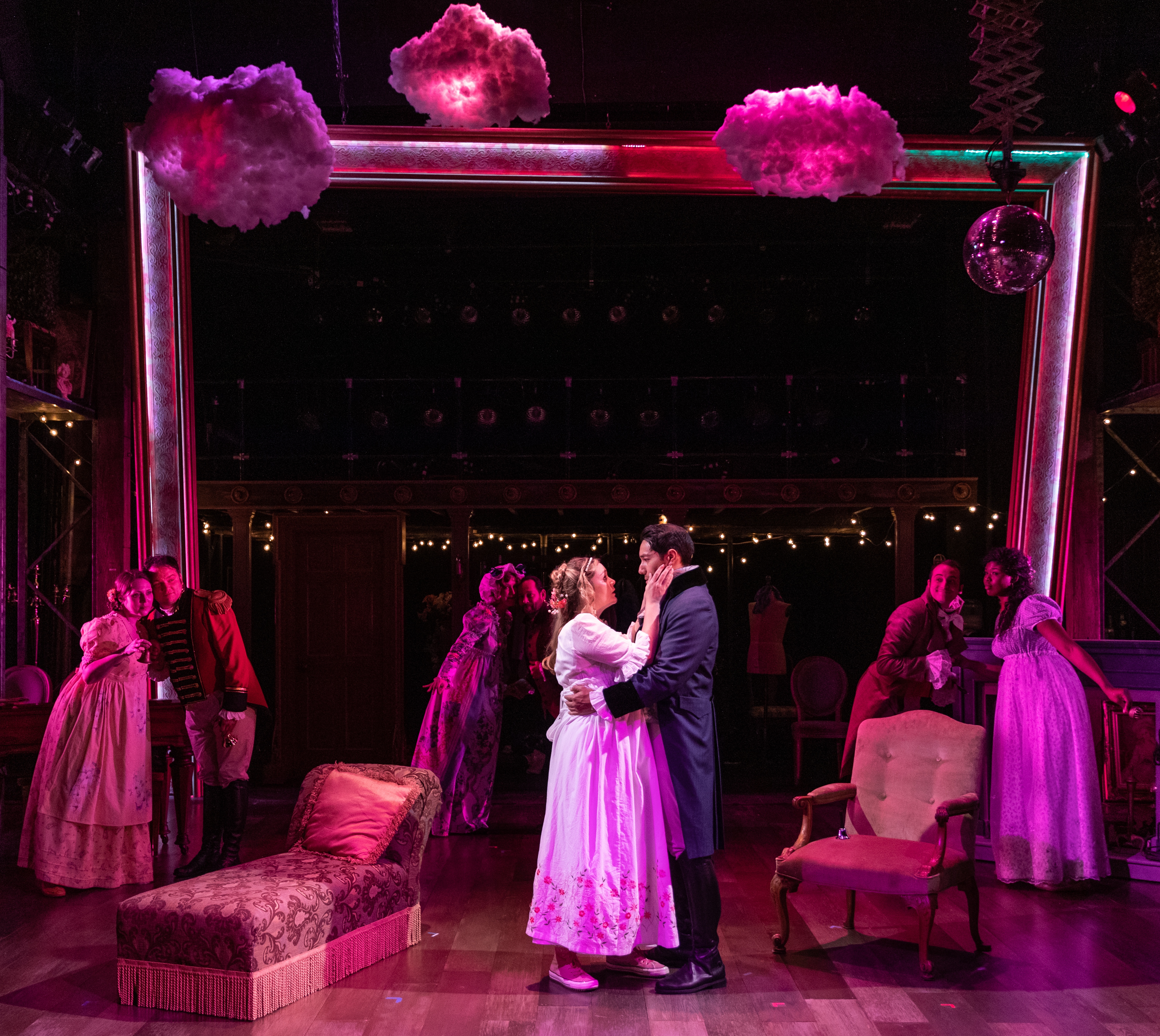Cygnet’s Fair ‘Pride/Prejudice’ Begs the Overarching Question: Why?
“It is a truth universally acknowledged,” Jane Austen writes in her landmark Pride and Prejudice, “that a single man of a good fortune must be in want of a wife.” It’s a cinch she busted her butt laughing as she committed this to paper. Not only is it delivered in deepest earnest as the 1813 novel’s opening line; it pigeonholes men into a category her Mrs. Bennet had a blast creating.

Lizzy Bennet and Fitzwilliam Darcy (Jacque Wilke and Steven Lone, center) might finally be getting things together. Photo by Karli Cadel Photography.
Mrs. Bennet, see, is hot to get her daughters married off to the well-to-do in hopes that one or all will help set her up in her old age (“My nuuuuhvs,” she groans melodramatically, as if that old saw works after the godzillionth time). What she doesn’t want to hear is that the kids are their own people when all is said and done — and this epiphany is at the core of Kate Hamill‘s adaptation of the eponymous story, up now at Cygnet Theatre.
It’s a pretty comfortable piece, with a lot of nuanced business designed to fuel the characters’ relatability to today. And Hamill, having once played daughter Lizzy, surely marinated within the text amid the courage of her and Lizzy’s convictions.
But this show is not exactly an update, as the flavor of Britain’s refined Georgian tenor is overwhelmingly intact. Those nuanced bits of business are fun and relatable, but alas, they can imprint themselves for only so long.
Y’all know the story or y’all know somebody who does: The five Bennet sisters (four here, including snot-nosed Lydia and tough-girl Lizzy) swoon as wealthy and eligible Charles Bingley moves into a mansion close by. They wonder if, amid his sophistication, he might be the first in a line of potential suitors. Meanwhile, Liz will cross paths with Bingley’s self-indulgent friend Fitzwilliam Darcy — and the battle is on, as Darcy falls in love with a girl beneath his class.
Everything comes out in the theatrical wash, including young Lydia’s elopement with the spurious George Wickham. Mrs. Bennet’s plan is in full swing now — but we’re left with the feeling that on so many levels, she’ll get more than she bargained for.
This piece is plied with music beds that feature tunes such as The Pointer Sisters’ “Jump (for My Love)” and Tina Turner’s “What’s Love Got to Do with It?,” especially through intermission.
‘Balls, balls, balls! I simply can’t get enough of ‘em!’ — Mrs. Bennet, in an unusually frisky mood
Daughter Mary gets into the act with an absolutely horrible piano solo of Bonnie Tyler’s “Total Eclipse of the Heart” — if she’s indeed responsible, Hamill couldn’t have picked a funnier moment to insert it.
And there’s generous opportunity to read between the lines, starting with double entendres like Mrs. Bennet’s “Balls, balls, balls! I simply can’t get enough of ‘em!”
The thing is that none of this vies for direct debate with the much deeper romantic love moral Austen was shooting for. It’s a clever script in many ways; it’s directed and choreographed quite well by Rob Lutfy and Michael Mizerany, who understand the art of nuance like few others; it’s full of very intelligent post-post-Renaissance women whose power is evident in their senses of self (even if they choose not to exercise it); and above all:
It’s a mystery why Hamill sought to imbue it with postmodern audios and sight gags. A wholesale reconstruction might have made more sense; that way, the modernist treatments, gender confusion and all, would have become more than the mere markers there are.
Kevin Hafso-Koppman’s dual turn as Bingley and daughter Mary is more than a marker indeed. Whereas Bingley honors the bearing of the times, Mary is a quasi-psycho runt of the litter, and Hafso-Koppman juggles both temperaments to perfection. Jacque Wilke’s Lizzy requires a colossally even mien (especially in dealing with Darcy), and as always, Wilke delivers. So does Steven Lone as the starchy, one-note Darcy.

In 2014, artist Melissa Dring created a three-dimensional model of Jane Austen (1775-1817). The familiar two-dimensional sketch is below.
Sean Fanning’s set sports a huge (if topheavy) proscenium, replete with gigantic abstract hardware; it all works well against the big neon sign that fetes Austen. Costumer Shirley Pierson and wig designer Peter Herman were up nights fueling the detail in their respective  crafts. Chris Rynne’s lights and Melanie Chen Cole’s sound draw the tech effort’s remaining fine lines.
crafts. Chris Rynne’s lights and Melanie Chen Cole’s sound draw the tech effort’s remaining fine lines.
In a program note, Hamill declares that “We think of (Pride and Prejudice) as this dated text, but the truth is, all of these rules and behaviors around love, we still very much follow today.”
She’s right, of course. Indeed, for those who follow those rules to the extreme, marriage is a bona fide suicide pact (not an original quote, but exceptionally apt). That’s where this piece, amid its showy nods to today, runs into trouble. Austen was a true feminist of her time; the modernist elements merely give her the benefit of the doubt.
This review is based on the matinee performance of May 19. Pride and Prejudice runs through June 16 at Old Town Theatre, 4040 Twiggs St. in Old Town. $25-$45. cygnettheatre.com, 619-337-1525.

Martin Jones Westlin, principal at editorial consultancy Words Are Not Enough and La Jolla Village News editor emeritus, has been a theater critic and editor/writer for 25 of his 47 years…
More…


